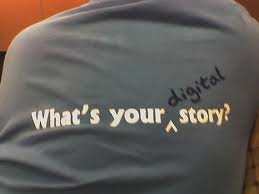Stories telling Stories
The book I am reading is Words at Work and Play by Shirley Bryce Heath. The main reason I chose this particular book is because of the way Bryce uses stories of individuals to “demonstrate how the nature of self-identification of individuals and families morphed in relation to when, where, and how they worked and played” (pg. 10). I have found through my years of schooling that I understand a concept or point better when it’s backed up with an example of a story.
I must admit that Bryce’s book is hard to follow because you forget sometimes that you are reading a book that is trying to relay the academic concept of how society, technology and familial sponsors influence the next generation, and then the next generation, and then the next generation, and so on. And Bryce does this by telling us in descriptive detail the stories of Jerome who was orphaned at an early age (11) and took it upon himself to get on a bus from the Bronx and travel to Chicago to choose his own foster family. He became his own sponsor by choosing his sponsor. Incredible. Then you are told about Zinnia, Jerome’s mother, who moved from South Carolina at age 16 because she was so overweight and depressed. She moved to the projects and raised three more children, without ever learning to read and write. She became her own sponsor when she joined the church and moved out of the projects. She taught herself how to pay bills, balance a checkbook and use a computer. Lisa escaped an abusive relationship after her husband threw their two-year-old son against a wall, causing brain damage. Lisa became her own sponsor by putting herself through college so she could better understand her son’s condition and help him. She graduated with a Masters in Sociology, an incredible accomplish from somebody with a troubled past. There’s Brandon who was bilingual due to is mixed heritage. He learned how to change his persona and language depending on what ethnic group he was hanging out with.
Woven into these stories are messages are examples of social practices and, most importantly and intriguing (at least to me) these are stories about people who sponsored themselves simply by wanting a better future for themselves and their children. This was a concept our group talked about a lot: self-sponsorship. These stories, we realized, were incredible and inspiring because each individual was responsible for their own “piling up” and “spreading out” of literacy.
Two really interesting points made in the story: society and family are huge sponsors for children when it comes to literacy, and those adults are usually influenced by their need for a better life, which in-turn, required them to seek a higher education to aquire a better job, and thus, a better life. That’s why I believe that Bryce entitled this follow up book: “Words at Work and Play”. We see the different social aspects of sponsorship: work, a job, higher education, a better life, religion, passion vs. playing around with friends, school clubs, theater, Boys and Girls Club, the playground, peer pressure.
It’s amazing the impact individuals have on each other. We always hear about peer pressure, but I’ve recently realized that peer pressure is usually discussed in a negative manner. Peer pressure to do drugs, pressure to steal, pressure to ditch school/play truant, pressure to lie, pressure to bully, pressure to fit in. But Bryce focused on the good and bad aspects of peer pressure, and for the most part she showed examples of the good. Pressure from family to want more in life, pressure for a mother to love her children so much she wants to achieve and set a good example, pressure to come up with plays and perform them in front of audiences, pressure to be a team leader, pressure to be a group leader- whether for a group of kids or for a club, pressure to be self-motivated, self-reliant, confident.
This book is pretty incredible and I am only half-way through it. There is a lot to grasp, but I enjoy it because it doesn’t read like an academic, philosophical text that I have to drone through to give a presentation. I am actually really enjoying and am excited to discuss it and share the knowledge I have gained from it in an Ignite Talk.


 Website:
Website: